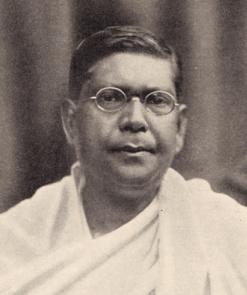On November 5, 2024, Lok Sabha Speaker paid tribute to Deshbandhu Chittaranjan Das on his birth anniversary at his portrait in the Central Hall of Samvidhan Sadan.
About Deshbandhu Chittaranjan Das
- Birth: Chittaranjan Das was born on November 5, 1870, in Calcutta (now Kolkata) into the Bengali Baidya family.
- Education: He attended the London Missionary Society’s Institution in Bhawanipur, graduating from Presidency College, Calcutta, in 1890.
- Law Studies: Das studied law at the Middle Temple in England, becoming a barrister in 1894.

Role in the Independence Movement and Contributions
- Prominent Leader: Known as ‘Deshbandhu’ (Friend of the Nation), Das played a pivotal role in India’s freedom struggle.
- Mentorship: He was a mentor to leaders like Subhas Chandra Bose.
- He was part of a non-official committee, along with Mahatma Gandhi and Motilal Nehru, investigating the Jallianwala Bagh massacre
- Congress Leadership: He actively supported Mahatma Gandhi’s Non-Cooperation Movement and served as President of the Indian National Congress in 1922.
- Founding of Swaraj Party: Disagreeing with Congress’s stance on council entry, he founded the Swaraj Party in 1923 with Motilal Nehru to push for self-governance.
- Alipore Bomb Case (1909): Das gained fame by successfully defending nationalist leader Aurobindo Ghosh, demonstrating his legal prowess and commitment to the freedom cause
- Chittaranjan Das was also the defence counsel in the Dacca Conspiracy Case (1910-11).
- Bengal Pact (1923): Das initiated the Bengal Pact to address economic imbalances and promote unity between Hindu and Muslim communities by proposing proportional representation in legislative bodies and government jobs.
Enroll now for UPSC Online Classes
Literary Contributions of Chittaranjan Das
- Poetry: He was an acclaimed Bengali poet, with works like Malancha, Mala, and Sagar Sangeet reflecting his passion for Bengali culture and literary talent.
-
- Sagar-Sangit (The Songs of the Sea): Published in 1913, this collection of poems showcased his early poetic talent.
- Antaryami (The All-perceiver): Released in 1914, this work delved into philosophical and spiritual themes.
- Kishor-Kishori (The Youth): Published in 1915, this collection explored the aspirations and challenges of youth.
- Literary Journal Narayan: He founded and edited this high-quality literary journal for five years, providing a platform for emerging writers and showcasing his own poetic works.
- Vaishnava Influence: His poetry often drew inspiration from the rich tradition of Vaishnava literature, reflecting the deep spiritual and philosophical influences on his work.
- Social Commentary: Some of his poems addressed contemporary social and political issues, reflecting his commitment to social justice and national liberation.
![]() 7 Nov 2024
7 Nov 2024


